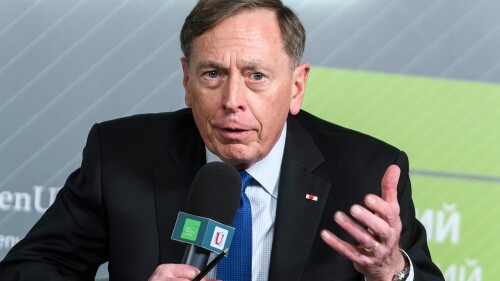Since late August 2025, the Islamist regime of Syria’s self-appointed president Ahmed al-Sharaa, also known by his nom de guerre Abu Mohammad al-Jawlani, has evicted members of the Alawi community from their homes in Damascus’ al-Sumariyah neighborhood.
The evictions are not a property dispute; they are part of an ongoing campaign of sectarian and ethnic cleansing designed to uproot, impoverish, and erase entire communities. The extremists are able to continue these crimes because the West, including President Donald Trump, rewarded them with political recognition and praise.
[Alawite] evictions are ... part of an ongoing campaign of sectarian and ethnic cleansing designed to uproot, impoverish, and erase entire communities
The al-Sumariyah evictions continue a repressive campaign. In March 2025, Jawlani’s newly formed army of Islamist extremist groups, including foreign jihadis, massacred over 1,500 Alawite and Christian civilians in the coastal region; thousands more disappeared. During the following two months, his regime targeted the Druze south of Damascus, scores of whom died. Then, in July, the Druze of Suwayda suffered another massacre, in which more than 1,300 died. The pattern is clear: Jawlani’s regime may promise reform and moderation when it engages Western officials, but its real policy continues to be to eliminate Syria’s diversity.
My father, former Vice President Rifaat al-Assad, built the heart of al-Sumariyah in 1979-1983, with funding from Saudi Arabia and under the guidance of then-Crown Prince (and later King) Fahd bin Abdulaziz, and with the backing of Prince Abdullah bin Abdulaziz, then second deputy prime minister and commander of the Saudi National Guard.
It consisted of sixty-five buildings, each four stories high, with two apartments per floor. It was designed for the officers and non-commissioned officers of my father’s Unit 568, which represented Syria’s diversity: Sunnis, Alawites, Druze, Christians, Murshidis, Kurds, Circassians, Armenians, and others. Their mission was to defend Damascus. Many came from distant provinces and often served on high alert for months at a time, unable to see their families. Al-Sumariyah was built to reunite them, and to bring their families close to the capital so that duty did not mean separation.
My father deliberately named it al-Sumariyah after the Sumerian civilization, the world’s first known civilization, which invented the wheel, irrigation, mathematics, and writing. The name symbolized progress, unity, and dignity—a vision of what Syria could and should be.
[Al-Sumariyah] symbolized progress, unity, and dignity—a vision of what Syria could and should be.
After my father left Syria in 1984, the dictatorship turned against the residents of al-Sumariyah. Because they were seen as my father’s supporters who had stood with him during the crisis of that year, when my father’s unit and the regime’s forces stood in a three-month military standoff, the regime singled them out for persecution, harassing and evicting families, and denying other basic services, simply because of perceived association.
At the same time, instead of building proper housing for ordinary Syrians, the regime allowed unplanned slums to spread around the area. A community that was designed as a symbol of modernity, unity, and progress steadily degraded into neglect.
Today, that persecution continues as the Islamist extremist regime targets Alawite families. The current evictions in al-Sumariyah are part of a broader campaign of organized demographic engineering that the Islamist regime undertook upon seizing power. Beyond outright sectarian cleansing, the Jawlani regime has pursued a campaign of impoverishment by dismissing tens of thousands of government employees on sectarian grounds, stripping minority communities of their livelihoods, and forcing them into confined geographic enclaves where they can be more easily controlled and economically weakened. It has suspended pension payments to dismissed workers and sought to drive Alawites from Damascus and from central and southern Syria into the coastal regions. At the same time, it is working to turn the entire Mediterranean coast into an economic backwater, dismantling both public factories and private workshops there and transferring them to Idlib, the epicenter of Jawlani’s political faction.
Jawlani may put on a business suit and try to reinvent himself as a moderate, but his treatment of minorities shows he still embraces the Islamist worldview of his former Islamic State and Al Qaeda compatriots: He seeks to persecute and eliminate all who do not conform to their twisted ideology.
The more the West empowers them, the more Jawlani’s militants will recruit, arm, and expand.
The West should not be complicit in allowing these extremists to continue to commit atrocities. The more the West empowers them, the more Jawlani’s militants will recruit, arm, and expand. Left unchecked, they will build a terrorist army on Europe’s doorstep. It is better to confront them now, before Turkey and Qatar realize their ambition to transform Jawlani into the commander in chief of a well-armed, well-trained military numbering in the hundreds of thousands.
When Western leaders meet and diplomats engage, it is neither neutrality nor without a cost. By legitimizing terrorists, Western governments strengthen them. What Syrians need is not another dictatorship nor a theocratic regime, but rather a representative democracy with a new, modern, secular, and progressive constitution that guarantees equality under the law for every citizen, regardless of religion, sect, ethnicity, or gender.
Syrians need an independent judiciary, free from political and religious interference. And Syrians need a federal system, geographically based, that preserves Syria’s unity while respecting the cultures, traditions, and identities of every region and community.
The eviction of Alawites from al-Sumariyah is not an isolated act; it is the latest stage in a deliberate campaign to erase Syria’s pluralism through blood, fear, and displacement. Alas, every moment the West indulges its own wishful thinking or helps Jawlani launder his image and agendas, makes Syria’s future as a country at peace with itself and its neighbors more distant.






